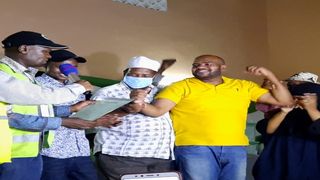
Independent candidate Feisal Bader (in yellow shirt) receives his election certificate after being declared MP-elect of Msambweni on December 16, 2020.
| Mohamed Ahmed | Nation Media groupPolitics
Premium
How ODM lost the script in Msambweni to lose seat
What you need to know:
- Msambweni was perceived as an ODM stronghold and the party was more likely to win the by-election.
- From the start, the by-election was coined as an Odinga versus Ruto contest.
Poor choice of candidate, factionalism, infighting and imposition of a national referendum on Kwale residents saw the Raila Odinga Orange Democratic Movement (ODM) party lose the Msambweni parliamentary seat in Tuesday’s by-election, analysis by the Nation reveals.
Independent candidate Feisal Bader, an ally of Deputy President William Ruto, garnered 15,251 votes to trounce ODM’s Omar Boga who secured 10,444 votes in the hotly contested poll marred by chaos.
The Nation has established that the win by Mr Bader, who beat Mr Boga in the latter’s Gombato/Bongwe and Ukunda ward strongholds, was as a result of ODM clinging on the national agenda of Building Bridges Initiative (BBI), which had little resonance with the locals.
The ODM team, led by Mombasa Governor Hassan Joho, Mr Boga’s chief campaigner, saw them favour big roadshow events — which entertain the youth, but hardly address issues — as their rivals took a totally different approach.
The rabble-rousing, bullish brand of politics and threats employed by Mr Joho, who is also the ODM deputy party leader, saw the team lose miserably to Mr Bader who also won in Kinondo, his stronghold, as well as Ramisi ward.
Msambweni was perceived as an ODM stronghold and the party was more likely to win the by-election as aspirants and respective allies put up a spirited campaign to replace Suleiman Dori, who died on March 9.
However, from the start, the by-election was coined as an Odinga versus Ruto contest, and precursor to the 2022 succession battle. This, Coast political analyst Hassan Mwakimako said, was a huge blunder by ODM.
BBI agenda
“The biggest mistake for them was to bring in the issue of BBI and other national issues, including the Handshake, to the people who were not familiar with the politics. To that effect, the voters did not turn up in good numbers to vote for ODM as they thought the issues were not touching on them,” said Prof Mwakimako.
Some of the diehard ODM supporters say the loss is symptomatic of the party’s diseased body politic even as Prof Mwakimako linked the upset to a lack of strategy for organising local politics.
ODM not only failed to live up to its name and to its political ideals, but also suffered from a crisis of vision. Mr Bader’s victory points to a deeper crisis gnawing at the heart of one of the most popular parties in the country.
On the eve of the end of campaigns, a member of ODM lobby group, Ngumu Tupu, called the Nation to air their grievances that the Kwale team had been left out of the campaigns and outshined by their Mombasa counterparts.
“Our aspirant no longer involves us, doesn’t pick our calls or introduce us during rallies. Several meetings have been held behind our back and, instead, the Mombasa team has taken charge of everything,” said the source who sought anonymity, fearing reprisals.
It has also emerged that Mr Feisal’s campaign team, led by Governor Salim Mvurya, held more rallies in a single day as Mr Boga focused on major rallies that would take days to organise.
The MP-elect capitalised on door-to-door campaigns.
Mr Mvurya also seized the opportunity to use Mr Feisal in issuing bursaries to the residents, which made them see him as the man who was continuing with the work that was done by his relative (Suleiman Dori), according to Prof Mwakimako.
The Ruto team included former senators Johnson Muthama (Machakos), Hassan Omar (Mombasa) and Boni Khalwale (Kakamega), and MPs Khatib Mwashetani (Lunga Lunga), Benjamin Tayari (Kinango), Mohammed Ali (Nyali) and Aisha Jumwa (Malindi).
Another grave mistake ODM committed was to not respect the wishes and interests of the majority and honour Mr Dori’s family.
From the outset, the Ruto camp sent a clear signal that it was out to right ODM’s wrongs by settling on Mr Bader — Dori’s nephew and long-time personal assistant.
Chest thumping campaigns
The DP on Wednesday congratulated Mr Bader on his resounding win in the mini-poll.
“Congratulations my friend Feisal Bader. Your win cements our trust in God and the people. Democracy and people power have triumphed. God bless you the people of Msambweni,” said the DP in a tweet.
Mr Mvurya energised Mr Bader’s team by publicly declaring support for him.
Mr Mvurya came out with a clear message of dismantling Mr Joho’s chest thumping campaigns by rallying residents not to be led by an outsider (Joho) in deciding their fate.
He also used his development track record to outsmart Mr Joho, whom he portrayed as failure.
The trickery politics, analysts at the Coast said, worked in favour of Bader’s team. Mr Mvurya likened Mr Joho to an entertainer rather than a leader and accused him of lacking respect.
This resonated well with the voters, some of whom perceived Mr Joho as an inciter trying to destabilise Kwale.
Mr Bader, 34, a young and ambitious person, has been the darling of Msambweni residents as he worked with Mr Dori as his personal assistant for almost a decade.
Mr Dori died in March after a short illness. The seat he left attracted eight candidates.






